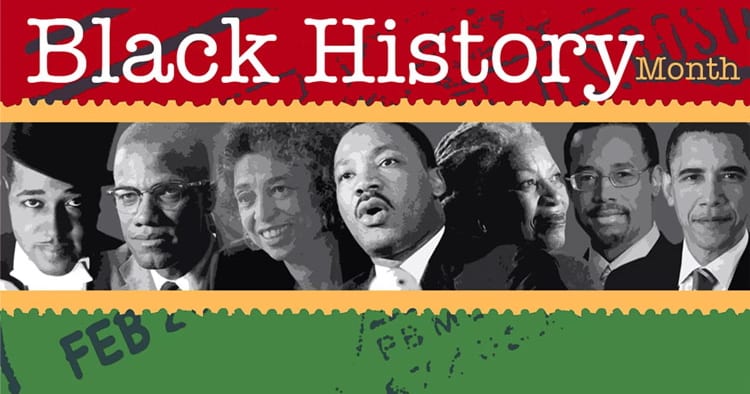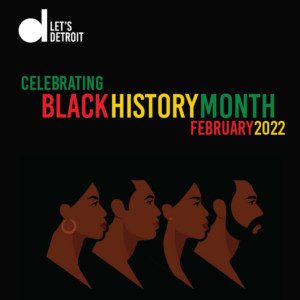
 Black History Month, also known as African American History Month, is an annual observance of the legacy, achievements, and contributions to history made by Black Americans and other people of African descent. It evolved from Carter G. Woodson’s annual Negro History Week, which began in February 1926. By the 1960s, “Negro History Week” became Black History Month on college campuses across the country, and in 1976, President Gerald Ford officially recognized the observance nationally.
Black History Month, also known as African American History Month, is an annual observance of the legacy, achievements, and contributions to history made by Black Americans and other people of African descent. It evolved from Carter G. Woodson’s annual Negro History Week, which began in February 1926. By the 1960s, “Negro History Week” became Black History Month on college campuses across the country, and in 1976, President Gerald Ford officially recognized the observance nationally.
This year, the theme of Black History Month is “Black Health and Wellness.” According to the Association for the Study of African American Life and History (ASALH) – also the organization Woodson founded – this goal was created to explore “the legacy of not only Black scholars and medical practitioners in Western medicine, but also other ways of knowing (e.g., birth workers, doulas, midwives, naturopaths, herbalists, etc.) throughout the African diaspora.”
To kick off Black History Month with this theme, ASALH is hosting a Black History Month Festival with the secondary theme, “Black Bodies: From Exploitation to Excellence.” The festival will explore Black American contributions to medical discovery and public health.
The festival will be held throughout February but will feature two main sessions with panel discussions exploring Black bodies’ historic exploitation to advance scientific and medical discovery. The first session, Exploitation in Medicine, will be on Saturday, Feb. 12, from noon to 2 p.m. The second session, Race Norming in the NFL, will be on Sunday, Feb. 27, from 5-6:30 p.m.
General admission for the two sessions is $65; general admission with Black history greeting cards and lapel pins is $125; general admission with a Woodson home ornament is $150. Learn more and register here.
In addition to the ASALH festival, here are some more ways you can honor Black History Month in 2022.
Learn Black History Through Art and Culture
- Watch Documentary Films of Madeline Anderson, 1-7. Newly preserved by the Smithsonian National Museum of African American History and Culture, the documentary films director Madeline Anderson made during the 1960s are “both essential records of activism and vital cinematic art.” The documentaries are split into two: Integration Report 1 (1960) and I Am Somebody (1970). The first examines the struggle for Black equality in Alabama, Brooklyn, and Washington D.C. The second follows the 1969 strike of Black women hospital workers in Charleston, South Carolina. The women were looking for union recognition and a wage increase only to find themselves battling the state government and National Guard. Both films can be watched online for free with registration until Feb. 7, at 9 p.m. Register here.
- Enjoy a performance by the Michigan Opera Theatre on Friday, Feb. 4, at 7 p.m., titled X: The Life and Times of Malcolm X. Composed by Anthony Davis, Pulitzer Prize-winning composer and pianist, with lyrics written by Thulani Davis, the performance will explore “how one man’s fight to define life on his own terms became a cry for justice of an entire people.” Both will appear live during the event to explore the collaboration that led to the 1986 premiere of the work by the New York City Opera and to perform selections from the score with company members from the new production. Register here.
- Celebrate Black History Month with the Livingston Diversity Council on Friday, Feb. 11, at 7 p.m., at a free screening of “Just Mercy.” Shown at the Historic Howell Theater, “Just Mercy” is based on the bestselling memoir by Equal Justice Initiative Director Bryan Stevenson and the case of Walter McMillian, who was convicted and sentenced to death for a crime he did not commit. Stevenson shared he hopes that people who watch the film “will walk away with a greater consciousness about why we need to do better in this country when it comes to creating a justice system that is fair and reliable.” Many attendees plan to gather for continued discussions at a nearby local establishment following the film. Register here.
- Celebrate Black History with the Charles H. Wright Museum of African American History. Participate in workshops and series, both online and in-person, geared toward exploring and celebrating Black American history and culture. Visit temporary and permanent exhibits, such as King Tutankhamun: “Wonderful Things” From the Pharoah’s Tomb and And Still We Rise. Stream Reflections with Andrew Young, a civil rights leader and U.N. Ambassador who works tirelessly to improve people’s lives around the world.
- Celebrate Black History Month in person at The Henry Ford. Visit the pop-up exhibit Quiet & Loud Protest anytime from Feb. 1 to March 31 to explore art showing quiet and loud ways that artist-activists have used graphics to demand change and organize communities. Take the “Stories of Black Empowerment” tour through the museum (download the THF Connect App first). Step into the 1940s and plan a road trip from Detroit to Chicago and learn what precautions a family of color made to avoid discrimination. Find other in-person activities and events at The Henry Ford here.
Get to Know Black Leaders
- Celebrate Black History Month with The Henry Ford and Ford Motor Company Fund at home with the Celebrate Black History Leadership Spotlight series. The Henry Ford is inviting social innovators to share their experiences and insights on empowerment as we reflect on the past and collaborate to build a better future for the next generation. The virtual series will be held on Facebook every Monday in February at 11 a.m.
- Feb. 7: Empowering the Youngest Generation to Grow Up Great
- Feb. 14: Empowering Financial Strength
- Feb. 21: Empowering the Next Generation of Engineers and Problem Solvers
- Feb. 25: Empowering Makers to Build a Better Future
- Feb. 28: Empowering Communities Year-Round
Get to Know Detroit’s Black History Through Tours and Conversations
- Take a virtual tour of the Detroit Riverfront on Thursday, Feb. 10, from 6-7 p.m., to learn the history and hear the stories of Black leaders and innovators, of Black heroes who saved lives and worked to make Detroit better, and of organizations and small businesses that played integral roles in Detroit’s Black community. The tour will take attendees throughout the decades along the Riverfront to learn about some of the historic people and places that helped shape Detroit and that are having an impact today. Register here.
- Learn about Detroit’s history of segregation and redlining, police brutality and the destruction of Black, Indigenous, and other people of color neighborhoods, and systemic racism during the Redlining, Racism, and Segregation donation-based virtual tour on Thursday, Feb. 17, from 6-7 p.m. Attendees will receive an overview of some of the most devastating policies and events in Detroit’s last 100 years, such as restrictive covenants and the uprising of 1967, and get context on how this past continues to impact our region today. The tour will also share local organizations fighting for racial justice and offer information on being a part of the solution moving forward. Register here.
(Can’t make this date? There’s another one on March 17. Register here.)
- Join the Detroit Historical Society for a conversation on community health and care on Thursday, Feb. 17, from 6:30-7:30 p.m. Malik Yakini, executive director of the Detroit Black Community Food Security Network, will discuss the history and contemporary impact of food as health and wealth for Black Detroiters and beyond. Register for Health as Wealth in Detroit’s Black Community now.
- Hear the stories of lifelong Detroiters during the Black History by Those That Lived It donation-based virtual tour on Thursday, Feb. 24, from 6-7:30 p.m. During the event, tour guides Glen Hendricks and Michael Daniels will share their 70+ years of experiences and personal stories that are woven into the larger history of Detroit. The stories will range from personal family stories about coming to Detroit during the Great Migration to growing up in Black Bottom and Paradise Valley to longtime Black businesses and being an entrepreneur in Detroit in the 80s. Admission is free with registration. Register here.
- Join the Detroit Historical Society for an in-person, all-ages celebration honoring the legacy of entrepreneurship in the Black Community in Detroit. On the Shoulders of Giants: Celebrating Black History Month will be held on Saturday, Feb. 26, from 10 a.m. to 5 p.m., and will highlight some of the businesses and history makers that continue to make Detroit great. They will also have a curated marketplace of locally owned businesses, guided mini-tours of the permanent Doorways to Freedom and Detroit 67: Perspectives exhibitions, and drop-in Paradise Valley-themed crafts from kids. Admission is free with registration. Register now.
Support Black-Owned Businesses
- Support Black independent authors at Detroit Book City’s 6th Annual African American Family Book Expo on Saturday, Feb. 19, from 12:30-5 p.m., at W. 8 Mile Road, Southfield, MI 48033. Created to promote, preserve, and sustain literacy while celebrating the heritage of Black history, the expo will offer attendees a chance to meet Black authors from around the country and get their books autographed. Families are encouraged to bring their kids to meet “Bookie,” Detroit Book City’s new book dog mascot, and get free Black history coloring sheets, crayons, bookmarks, and other goodies. Admission to the event is free if tickets are purchased online; door admission is $1. Register here.
- Get a “Taste of Black Spirits” on Saturday, Feb. 19, from 6-10 p.m., at The Garden Theater. The event was made “to create awareness of Black American-founded spirits brands with the intentions of expanding distribution opportunities.” Michigan-based Black-owned brands will also be featured, including Anteel Tequila, Motu Viget, Stock da Bar, Black Calder Brewery, Opulence Wine, and The Roche Collection. Tickets start at $55. Register here.
Click here for eight ways to find Black-owned businesses in Southeast Michigan, and explore the companies we featured in 2021 for National Black Business Month.

 Black History Month, also known as African American History Month, is an annual observance of the legacy, achievements, and contributions to history made by Black Americans and other people of African descent. It evolved from Carter G. Woodson’s annual Negro History Week, which began in February 1926. By the 1960s, “Negro History Week” became Black History Month on college campuses across the country, and in 1976, President Gerald Ford officially recognized the observance nationally.
Black History Month, also known as African American History Month, is an annual observance of the legacy, achievements, and contributions to history made by Black Americans and other people of African descent. It evolved from Carter G. Woodson’s annual Negro History Week, which began in February 1926. By the 1960s, “Negro History Week” became Black History Month on college campuses across the country, and in 1976, President Gerald Ford officially recognized the observance nationally.